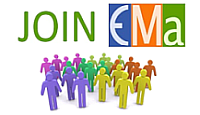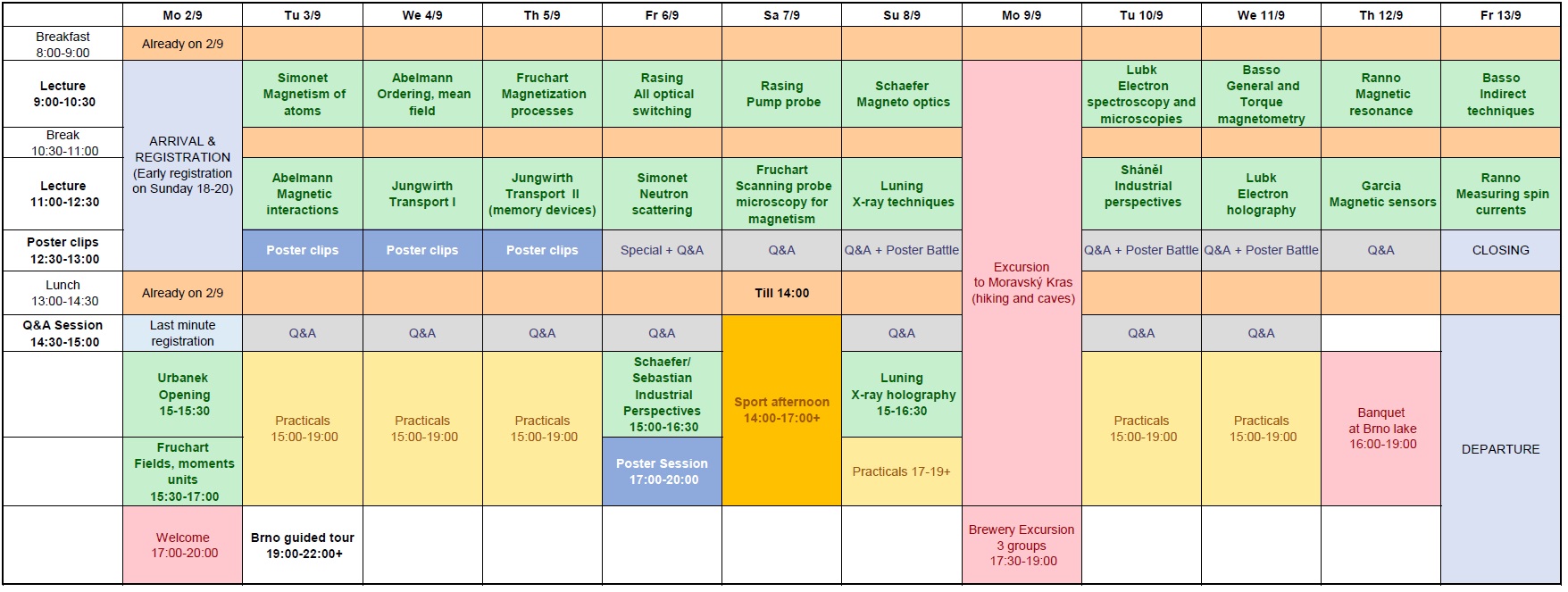Program

Below you can find slides of lectures and other supporting material for ESM 2019.
Download ESM 2019 Booklet
Q&A = Questions & Answers session
Poster clip = Short (1 slide, 1-2 min) poster presentation (teaser)
Lectures of Prof. Abelmann required your previous preparation - see the corresponding abstracts [abs1, abs2]. An evidence-based, interactive teaching method - Peer instruction - was used during these 2 sessions.
Lectures
Introduction to the School (1h)
- Opening
- Motivation for the School: Michal Urbánek, Brno, Czech Republic ― Chair
I. Basic concepts (3h)
- Fields, Moments, Units: Olivier Fruchart, Grenoble, France [ Abstract | Slides ]
- Magnetism of atoms, Hund's rules, spin-orbit in atoms: Virginie Simonet, Grenoble, France [ Abstract | Slides ]
II. Magnetism in matter (6h)
- Magnetic ordering, mean field: Leon Abelmann, Saarbrücken, Germany [ Abstract | Peer Instruction - Questions I ]
- Magnetic interactions. Anisotropy, Leon Abelmann, Saarbrücken, Germany [ Abstract | Peer Instruction - Questions II | Hints ]
- From Charge Currents to Spin Currents: Laurent Ranno, Grenoble, France [ Abstract | Slides ]
- Transport, (magnetic) memory devices: Tomáš Jungwirth, Nottingham, UK & Praha, Czechia [ Abstract | Slides ]
III. Magnetization processes (3h)
- Magnetization textures and switching: Olivier Fruchart, Grenoble, France
[ Abstract | Slides ] - All-optical control of magnetization: Theo Rasing, Nijmegen, Netherlands [ Abstract | Slides (pt.1&2) ]
IV. Techniques (19h 30m)
- Scanning probe microscopy for magnetism: Olivier Fruchart, Grenoble, France [ Abstract | Slides ]
- X-ray techniques: synchrotron, FEL, HHG: Jan Lüning, Berlin, Germany [ Abstract | Slides ]
- Electron microscopy and spectroscopy: Axel Lubk, Dresden, Germany [ Abstract | Slides ]
- Holography, tomography (Electron, X-ray):
- Magneto-optics: Rudolf Schaefer, Dresden, Germany [ Abstract | Slides ]
- Time-resolved pump-probe techniques: Theo Rasing, Nijmegen, Netherlands [ Abstract | Slides (pt.1&2) ]
- General and torque magnetometry: Vittorio Basso, Torino, Italy [ Abstract | Slides ]
- Magnetic resonance(s): Laurent Ranno, Grenoble, France [ Abstract | Slides ]
- Neutron scattering: Virginie Simonet, Grenoble, France [ Abstract | Slides ]
- Indirect techniques: calorimetry, dilatometry, transport: Vittorio Basso, Torino, Italy [ Abstract | Slides ]
- Magnetic sensors: Alfredo Garcia Arribas, Bilbao, Spain [ Abstract | Slides ]
- Magnetic memories from a broad IT, materials, and physics perspectives: Tomáš Jungwirth, Nottingham, UK & Praha, Czechia [ Abstract | Slides ]
V. Industrial perspectives (3h)
Two contributions are scheduled from outside the world of lab research. These are intended to promote thinking about economical, ethical or societal issues, and provide an opportunity to discuss and debate about career opportunities for PhD scientifists beyond their defense. 3 different contributions: side bussiness of a researcher (Evico Magnetics), startup (THATec Innovation), and corporate (ThermoFisher Scientific).
Other activities
Practicals (6-8h)
Practical are organized to practice the use of numerical, analytical or experimental techniques, related to topics covered by the lectures. Computers will be provided on-site and readily setup for the practicals.
Each practical is typically 2h or 4h (e.g. experimental ones). Attendees will be asked on-site for their wishes to attend such or such practicals, however, it is not possible to attend all of them. All participants had possibility to attend 3 practicals.
- Practical on Units (2h): Olivier Fruchart, Grenoble, France [ Abstract | Assignment | Answers ]
- Practical on Domain Walls (2h): Olivier Fruchart, Grenoble, France [ Abstract | Assignment | Answers]
- An introduction to magnetism of ferrimagnets (2h): Olivier Isnard, Grenoble, France [ Supporting materials ]
- Experimental Magnetism off the lab (2h): Laurent Ranno, Grenoble, France [ Abstract ]
- Controlling laboratory experiments in Labview: Thomas Sebastian & Thomas Meyer, Mannheim, Germany [ Abstract | Slides ]
- Magnetic force microscopy (MFM): Marco Corbetta & Michal Staňo, Dübendorf & Brno, Switzerland & Czech Republic [ Abstract ]
- Kerr microscopy (magneto-optics): Rudolf Schaefer & local support, Dresden, Germany [ Abstract ]
- Lorentz microscopy (L-TEM): Marek Vaňatka, Brno, Czech Republic [ Abstract ]
- Scanning electron microscopy with polarization analysis (SEMPA/spin-SEM): Michal Staňo, Brno, Czech Republic [ Abstract | Slides ]
- Vibrating sample magnetometry (VSM): Jon Ander Arregi, Brno, Czech Republic [ Abstract | Slides ]
- Brillouin light scattering (BLS): Thomas Sebastian & Thomas Meyer & local support, Mannheim, Germany [ Abstract ]
- Micro and nanolitography: Jakub Sadílek, Brno, Czech Republic [ Abstract ]
- Vector Network Analyzer-Ferromagnetic Resonance (VNA-FMR): Igor Turčan, Brno, Czech Republic [ Abstract ]
Library
A library consisting of a large set of books dedicated to various aspects of Magnetism is on display during the entire School. Its purpose is first to get students aware of the existing books, get acquainted with their use, and also serve as a support for activities during the School. 2019 List of books, see also the list of books on display at ESM2017.
Question-Answer sessions (6h)
The purpose of a research School is to provide young scientists with the basics in a working field. With this respect interactivity between students and lecturers should be promoted. Like in the previous editions, a key aspect of this interactivity is the possibility to raise questions at the end as well as during the course of the lectures. Besides, several sessions of questions take place, during which the lecturers or voluntary students present in more detail issues raised by the students during the lectures or anonymously through a question-box. See the list of questions raised in 2019.
Posters
We encourage participants to bring posters (A0 portrait) to present their work. Posters will be hanged during coffee breaks and special sessions. Students are asked to present their poster in a one-slide-one-minute (max 2 slides/2min) presentation (poster clips) as an exercice to summarize their work. Please have such slides prepared in an electronic format!
2019: Poster battles intorduced! 6 participants volunteered to be a selection committee and each member nominated one poster. In duels, members were defending the selected poster and explaining their choice. The best poster and "defender" were selected by all participants via an app. All 6 volunteers and 3 best prosters received a valuable prize (external HDD or magnetism-related book). THE best poster receiving fee waiver for JEMS2020 was eventually selected by the ESM lecturers.







